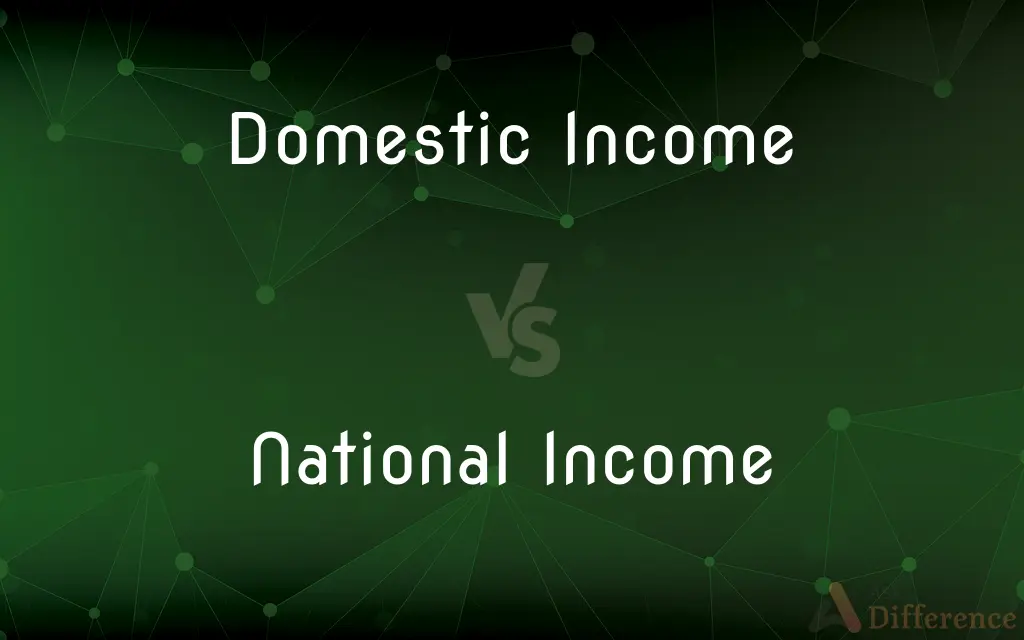Domestic Income vs. National Income — What's the Difference?
By Tayyaba Rehman — Published on October 24, 2023
Domestic Income refers to the total income generated within a country's borders, regardless of who earns it. National Income encompasses the earnings of a nation's citizens, both at home and abroad.

Difference Between Domestic Income and National Income
Table of Contents
ADVERTISEMENT
Key Differences
Domestic Income and National Income are both important economic indicators, but they represent different facets of an economy. Domestic Income, often referred to as Gross Domestic Product (GDP), calculates the value of all goods and services produced within a country's borders. This includes the earnings of foreign entities operating within that country. Conversely, National Income includes the income earned by the citizens and businesses of a nation, regardless of whether they operate within the country or internationally.
When discussing Domestic Income, one is specifically addressing the economic activities that occur inside a nation's territorial borders. It does not differentiate between who generates the income; both nationals and foreigners are included. National Income, however, is more about the earnings of a nation's citizens. If an American company operates and earns profits in France, those profits contribute to the U.S.'s National Income, but France's Domestic Income.
In understanding the dynamics of an economy, both Domestic Income and National Income offer distinct perspectives. Domestic Income provides a snapshot of the total economic activity happening within a country, reflecting its attractiveness and capability as a place to conduct business. In contrast, National Income gives insights into the global earning power of a country's citizens and entities, showcasing the global influence and reach of its economy.
To illustrate further, if a German automobile company has a manufacturing plant in the U.S., the profits from that plant would increase the U.S.'s Domestic Income because the production is occurring within American borders. However, because the profits eventually go back to Germany, they increase Germany's National Income and not the U.S.'s. This distinction is crucial for policymakers and economists when analyzing a country's economic health and making informed decisions.
Comparison Chart
Definition
Income from activities within country borders
Income earned by citizens, domestically and internationally
ADVERTISEMENT
Includes
Earnings of both nationals and foreigners in the country
Earnings of nationals, excluding foreigners' income in the country
Excludes
Earnings of nationals abroad
Earnings of foreigners in the country
Example
Foreign company's profits from operations in the country
National company's profits from operations abroad
Used in
Calculating GDP
Calculating GNI (Gross National Income)
Compare with Definitions
Domestic Income
Sum of all residents' and non-residents' production in a nation.
Thanks to both local and foreign businesses, the Domestic Income of Canada remains robust.
National Income
Excludes income generated by foreigners within the country.
Profits of British companies in India won't contribute to India's National Income.
Domestic Income
Income generated within a country's borders.
Despite the foreign investments, the U.S.'s Domestic Income saw a steady rise.
National Income
Represents the economic strength of a country's citizens globally.
High National Income indicates that a country's residents have strong global economic influence.
Domestic Income
Does not factor in nationals' income from abroad.
Despite many citizens working overseas, their earnings don't impact Domestic Income.
National Income
Used in the calculation of Gross National Income (GNI).
By adding certain factors to National Income, economists determine GNI.
Domestic Income
Basis for Gross Domestic Product (GDP) calculation.
Domestic Income, when adjusted for certain factors, gives the GDP.
National Income
Reflects the global reach of a country's economy.
Japan's high National Income showcases the global presence of its businesses.
Domestic Income
A measure of a country's economic performance.
Economists use Domestic Income to gauge the health of an economy.
National Income
Total earnings of a nation's residents, at home and abroad.
The U.S. National Income includes profits of American firms operating in Europe.
Common Curiosities
Can a country have a low Domestic Income but a high National Income?
Yes, if its citizens or businesses earn significantly abroad.
Is Domestic Income always higher than National Income?
Not necessarily; it depends on the net earnings of nationals abroad versus foreigners in the country.
Does Domestic Income account for income repatriated to foreign countries?
Yes, it includes all income generated within the country, regardless of where it's eventually sent.
What does Domestic Income primarily measure?
Domestic Income measures the total income generated within a country's borders.
How does National Income differ from GDP?
National Income includes nationals' earnings abroad and excludes foreigners' earnings in the country, whereas GDP doesn't.
Can National Income be seen as a measure of a country's economic autonomy?
To some extent, as it reflects the earnings potential of its citizens regardless of location.
How does National Income provide insights into a nation's global influence?
It encompasses the earnings of a nation's entities globally, indicating their international economic reach.
Why might a country focus on increasing its Domestic Income?
To boost its internal economic activity and create more domestic opportunities.
Are remittances from citizens working abroad included in National Income?
Yes, they contribute to the National Income.
Why might a country's Domestic Income decline?
Economic downturns, natural disasters, or a decrease in foreign investments can cause this.
Share Your Discovery

Previous Comparison
Access vs. Entrance
Next Comparison
Autonomous Demand vs. Derived DemandAuthor Spotlight
Written by
Tayyaba RehmanTayyaba Rehman is a distinguished writer, currently serving as a primary contributor to askdifference.com. As a researcher in semantics and etymology, Tayyaba's passion for the complexity of languages and their distinctions has found a perfect home on the platform. Tayyaba delves into the intricacies of language, distinguishing between commonly confused words and phrases, thereby providing clarity for readers worldwide.












































